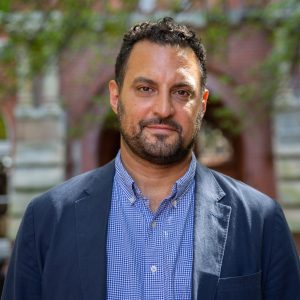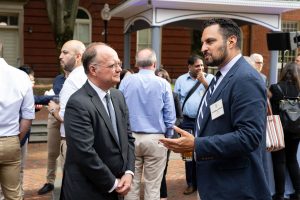This fall, Jonathan Lincoln joins SFS as the interim director of the Center for Jewish Civilization (CJC) and the Andrew Siegal Visiting Professor. Lincoln takes over the role of director from Professor Bruce Hoffman, who has led the center since 2020. Lincoln has taught courses at SFS before, on the history of the United Nations and the Arab-Israeli conflict as well as the impact and evolution of Israel’s relations with the Arab and Muslim World. As he transitions to his role as director, he brings his perspective from an extensive career with the United Nations to his approach.
“It is my sincere aspiration that the CJC, through its wide range of course offerings ranging from the humanities, Hebrew language, international affairs and Holocaust studies, helps its students and the wider Georgetown community to better understand and appreciate the multifaceted aspects of the past, present and future of Jewish Civilization,” Lincoln says.
The CJC is an interdisciplinary teaching and research unit at SFS that strives to create and promote scholarship on Jewish Civilization. The Program for Jewish Civilization (PJC) was founded in 2003 by the SFS, under the leadership of Georgetown’s Jewish chaplain, Rabbi Harold White, and Georgetown professors Robert J. Lieber and Yossi Shain. The PJC was relaunched as the CJC in 2016, and has continued to promote a deeper understanding of the world’s religious communities.
Bringing Global Experience to the Hilltop
Lincoln spent fifteen years with the United Nations Secretariat where he had a varied career, most recently as the head of office for the UN deputy special coordinator based in Jerusalem, working on the coordination of UN and international development assistance to Palestinians in Gaza and the West Bank.
Prior to his appointment in Jerusalem, Lincoln served as the senior political affairs officer for North Africa, managing a team of political affairs officers covering Libya, Tunisia, Algeria, Morocco, and support for the personal envoy of the secretary-general on Western Sahara. Before that role, Lincoln was a political affairs officer with UNMIS/S and the UN special envoy for Sudan and South Sudan, working primarily from Juba, South Sudan.
“These experiences, alongside my academic training at the University of Wisconsin Madison and at SOAS at the University of London, are what informs my teaching as well as what I hope to bring to the study of Jewish Civilization,” Lincoln says.
Lincoln has also worked with the Washington Institute for Near East Policy, the Council on Foreign Relations and the International Crisis Group.
“Having worked for most of my career on various aspects of conflict resolution and prevention and having engaged in inter-communal and inter-religious dialogue, I see these as core values for the CJC that are also entirely consistent with Georgetown’s mission as embodied in its Jesuit heritage.”
Fostering the CJC on Campus
Lincoln aspires to grow the CJC and share facets of Jewish civilization with more students on campus. In the short term, this means working closely with CJC faculty to amplify the center and its mission.

“I also want to ensure that the CJC is well positioned to contribute effectively to the many debates, on campus and beyond, concerning the Jewish experience in the United States, as it relates to global affairs and of course the impact of the unprecedented political crisis taking place in Israel,” Lincoln shares. “I see the CJC as a collaborative center, working closely with the other centers and programs of the SFS and the University to foster these discussions and to enhance our course offerings.”
Over the long term, Lincoln hopes to see the CJC’s enrollment grow, including in the Hebrew language program. Additionally, he would also like to see more students participate in at least one CJC course during their time at Georgetown.
Coinciding with a Changing Climate
In the current uncertain global political climate, Georgetown’s continuous investment in the study of Jewish Civilization serves as an important hub for academics to come together and exchange ideas and research. Lincoln’s extensive experiences from his career also serve as a unique resource for curious students.
“In addition to academic sources, I like to share anecdotes from my experiences, and offer an insider’s perspective on events that the students are reading about,” he says. “Given the dramatic changes taking place across the world that have such an outsized impact on Jewish Civilization, I think it is important to produce events for students that help explain the implications of phenomena such as rising anti-semitism and shifts in Israeli politics on the areas of study at the CJC. And it is just as important to expose students and our community to the latest scholarship on Jewish Civilization including History, the study of the Holocaust, art, music, literature and film. It is this combination of offerings that makes the CJC unique within the broader framework of the SFS and helps to complement the CJC’s already robust academic programming.”
As Lincoln transitions to director, he reflects on his time thus far at Georgetown and his future with the CJC.
“Admittedly, what I didn’t expect was to feel as connected to the students as I have over the past two years. What I am looking forward to most is to work closely with the students and faculty to see how we can uphold and improve the reputation of the CJC as fostering strong and vibrant academic and social engagement within the wider Georgetown community.”